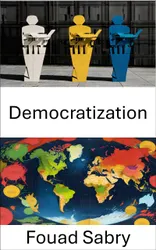Power Vacuum explores the significant role of power vacuums in global politics and their wide-reaching consequences. It delves into how leadership voids can reshape political landscapes, shift alliances, and spark conflicts. This book offers an in-depth analysis of power vacuums and the instability they cause, as well as the measures governments can take to mitigate such crises.
Chapters Brief Overview:
1: Power Vacuum – Defines the concept and its role in political shifts.
2: Rogue State – Analyzes how rogue states exploit vacuums to further destabilize regions.
3: Hafez al-Assad – Studies the Syrian leader's power consolidation amid Middle Eastern vacuums.
4: Legitimacy of NATO Bombing of Yugoslavia – Questions interventions in power-devoid Yugoslavia.
5: War Powers Resolution – Examines how unclear authority leads to military conflicts.
6: Succession of States – Discusses state breakups and the resulting legal and political vacuums.
7: Adnan Pachachi – Details efforts to stabilize Iraq after Saddam Hussein’s downfall.
8: Ricardo Sanchez – Highlights military responses to the early Iraq War vacuum.
9: Jaafar Nimeiry – Reviews the Sudanese leader’s tumultuous rule during domestic instability.
10: 2003 in Iraq – Explores the long-lasting effects of the power vacuum post-invasion.
11: U.S. Military Operations – Reviews U.S. interventions spurred by regional vacuums.
12: Breakup of Yugoslavia – Examines the ethnic conflict following Yugoslavia's dissolution.
13: Cold War Events – Chronicles Cold War conflicts fueled by power voids in post-colonial nations.
14: Coups and Coup Attempts – Lists coups and their causes in leadership vacuums.
15: Bill Clinton’s Foreign Policy – Explores Clinton’s response to international crises from vacuums.
16: U.S. Foreign Interventions – Looks at how vacuums have shaped U.S. global actions.
17: Ming-Kotte War – Discusses Sri Lanka's regional instability and Ming involvement.
18: 17 July Revolution – Analyzes Iraq's 1968 revolution and subsequent power consolidation.
19: Ming Treasure Voyages – Highlights China’s expansion during regional vacuums.
20: Libyan Crisis – Investigates the ongoing conflict after Gaddafi’s fall.
21: 1985 Sudanese Coup – Studies the political reconfigurations following Sudan’s 1985 coup.
This book is an essential read for understanding how power vacuums, from historical events to modern conflicts, shape political structures and global interactions. Through an analysis of case studies like the breakup of Yugoslavia, the Iraq War, and various coups, readers gain a broad understanding of the ripple effects of leadership voids and the actions taken to address these crises.
























